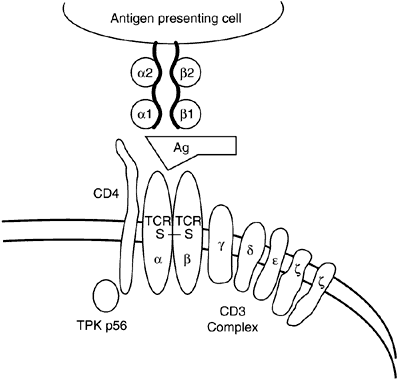

|
| Fig. 7. Antigen presentation: major histocompatibility complex (MHC) class II. Antigens (Ag) are modified and transported as antigenic determinants to the surface of antigen-presenting cells (APC). On the cell surface of the APC, processed antigen interacting with MHC class II determinants (α and β chains) binds to the T-cell receptor (TCR) of the CD4+ T cell. The CD4 determinant on the surface of the helper (CD4+ ) T cell enhances the binding of the TCR to the antigen-APC complex by binding to the MHC class II determinant. Binding of specific antigen to the TCR complex initiates T-cell activation and signal transduction by the CD3 complex. The CD4 molecule also may act as an accessory signal to enhance T-cell activation through tyrosine protein kinase (TPK p56) phosphorylation of the Þgz chain of the CD3 complex. (After Medical Knowledge Self-Assessment Program [MKSAP]: Allergy and Immunology, Book 1, p 160. Philadelphia: American College of Physicians [ACP], 1993.) |